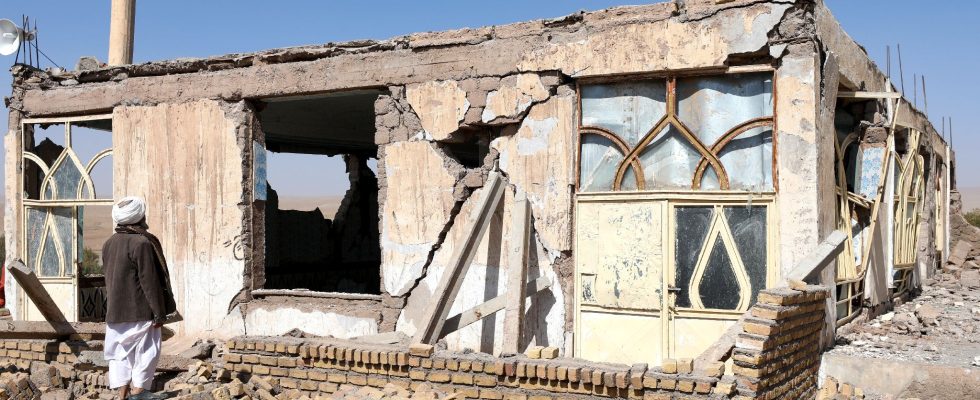AFGHANISTAN
Earthquake kills thousands
A powerful earthquake with a magnitude of 6.3 struck western Afghanistan on October 7, in the province of Herat, where nearly two million Afghans live. The Taliban authorities reported the next day a provisional toll of more than 2,500 deaths. The thorny question of sending humanitarian aid immediately arose, “with most countries in the world hesitant to deal directly with the Taliban government, and focusing on the conflict between Israel and the Palestinians”, analysis The Diplomatwho adds that the lack of suitable equipment in Afghanistan only worsens the situation.
ISRAEL
Unity despite political divisions against Hamas
Since Hamas’ deadly attack on Israel from the Gaza Strip, launched on October 7, Israeli politicians have closed ranks in the face of what Prime Minister Benjamin Netanyahu has described as a “war”. Several opposition leaders have shown themselves in favor of a government of national unity, and thousands of reservists are rushing to take up arms. The government, with its far-right parties, however, remains highly criticized. The left fears that the desire for revenge will cause an uncontrollable escalation, with already the announcement of a total siege on Gaza. “Israel must not act like Hamas,” warns daily life Haaretz.
UNITED STATES
Sending military aid to Israel and paralysis on Ukraine
After Hamas’ massive attack on Israel, US military aid to Jerusalem will include the deployment of an aircraft carrier and warships. “The emergency situation in Israel comes as the House of Representatives finds itself in a state of paralysis and in uncharted legal territory,” explain CNN, due to the impeachment of the president in the House of Representatives since October 3. While military aid to Ukraine is currently blocked, “the Hamas attack was the subject of broad bipartisan condemnation among lawmakers,” the site said.
GERMANY
Sanction vote for the coalition
The three ruling parties suffered a severe setback on October 8 during regional elections in Bavaria and Hesse. The Social Democrats of Chancellor Olaf Scholz, the Greens of Economy Minister Robert Habeck and the Liberals of Finance Minister Christian Lindner have retreated in these two conservative bastions, outstripped by the far-right AfD party on the rise (14, 6% in Bavaria and 18.4% in Hesse). “Germany is moving to the right, observe the daily South German Zeitung. This will make it even more difficult for the chancellor to govern.”
DEMOCRATIC REPUBLIC OF CONGO
A Nobel Prize candidate
Their names must still be validated by the Constitutional Court. On October 9, the Electoral Commission unveiled the list of 24 candidates for the December 20 presidential election. Among them, the favorite and outgoing president Félix Tshisekedi, two opposition heavyweights, the former governor of Katanga Moïse Katumbi and the businessman Martin Fayulu, but also the surgeon Denis Mukwege, Nobel Peace Prize winner. . This one is the “troublemaker” of the election for the site Afrikarabia and “will have to establish himself as a unifier if he wants to have influence in a ballot already saturated with candidacies from opponents”.
GEORGIA
Soon a Russian base in Abkhazia
Recognized as an independent republic by Moscow, the secessionist and pro-Russian territory of Abkhazia, Georgia, will host a Russian naval base in the Ochamtchire district. An agreement would have been signed to this effect, said the self-proclaimed Abkhazian president, Aslan Bjania, on October 5. The announcement comes as the Russian navy, hit several times by the Ukrainian army in Sevastopol, has moved some of its ships to Novorossiysk, further east. “All this seems to suggest that Russia is starting to think about other places where it could base its Black Sea fleet and speaks to the uncertainty it feels in Crimea,” analyzes the Russia desk of the BBC.
UNITED KINGDOM
No TGV for the North
The future British “TGV” was to connect London to Manchester and open up the north of England. But Prime Minister Rishi Sunak announced on October 4 that the new high-speed line, whose costs have exploded, would go no further than Birmingham. The leader of the conservatives prefers to reinvest the 41 billion euros which were to be devoted to the canceled section in “hundreds of new transport projects”. However, estimated The Guardian, this “cancellation reveals Britain’s crippling absence of an industrial strategy”. The daily also worries about “political and commercial consequences [qui] are likely to be disastrous.
